
Free Stuff
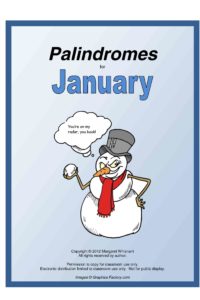
What do the word “sis” and the sentence “Madam, I’m Adam” have in common? Both are palindromes–words, phrases, and sentences with individual letters that sit in the same sequence whether they are read forward or backward. With January being the month named after the ancient Roman god whose two faces allowed him to look into the past and into the future, it seems a fitting time to entertain and challenge students with the back-and-forth palindrome concept.
PALINDROMES FOR JANUARY is divided into three parts. The first, with 30 items, focuses on one-word palindromes. Part two, deals with a set of 25 palindrome phrases that students can assemble by supplying the missing letters. The third portion is the ultimate challenge with 25 sentences, again with missing letters that students can identify by applying the sequencing principle of palindromes.
Full answer keys included.
Download HERE. (Use back arrow to exit your free download.)

February Idioms from the Heart is a combination history and figurative language lesson.
Each of the forty original sentences, organized as two separate activities of twenty items each, are constructed around an idiom with the word heart in it. Students must interpret the hidden meaning in each one. The preliminary Student Page briefly explains the history behind our language’s large collection of idiomatic expressions that erroneously attribute human emotions and personality traits to the heart.
Download this free item and treat your students to something a little different this Valentine’s Day. (Use back arrow to exit your free download.)
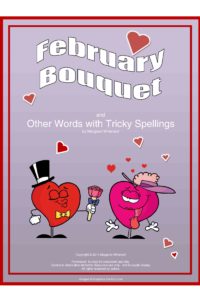
Full answer keys included.
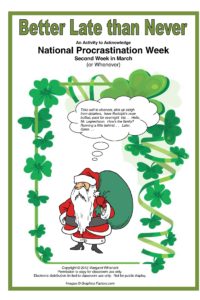
This free download, entitled BETTER LATE THAN NEVER, acknowledges Procrastination Week’s existence and then delves into vocabulary with the letters L-A-T-E hidden in their spellings.
Students are instructed to use the given definitions and clues to fill in missing letters and unmask 35 different “late” words. Some of the terms will be familiar, but others will be more difficult to identify, if and when your students get around to them.
Full answer keys are included.
Download your copy now. Or whenever.
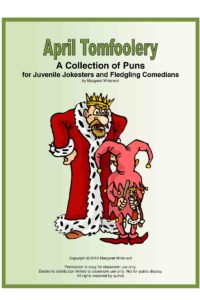
April Tomfoolery is a 40 item collection of puns with strong kid-appeal presented in question and answer format. Your youngsters can put them to use right away on April 1. Then the fun continues through another six days as the first week of April is set aside as Laugh at Work Week. But wait! There’s more! All of April–the whole thirty days–is designated as National Humor Month.
Download your copy of this April freebie, distribute to students, and prepare yourself for a long stretch of listening to corny jokes. Why not choose a few favorites and join in? After all, tomfoolery has no age barriers!
Download HERE (Use back arrow to exit your free download and return to site.)
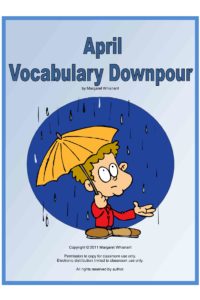
April’s designation as a month of rain is the anchor for this fifty-item brain teaser/vocabulary builder. Students are challenged to identify words that have the actual letters r-a-i-n or letter combinations that sound like “rain” within their spellings. Also included are interpretive questions based on idiomatic expressions with the word rain.
Five total pages including full answer keys.
Download HERE. (Use back arrow to exit your free download and return to site.)
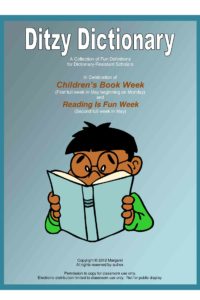
Children’s Book Week (the first full week of May) and Reading is Fun Week (the second full week of May) are the inspirations for the Ditzy Dictionary. Though they are necessary resources for reading comprehension, dictionaries have never made any young scholar’s most-fun book list. The Ditzy Dictionary just might do it!
Students will enjoy matching regular words to their ditzy definitions. “Vitamin,” for example, sheds its standard meaning and becomes “what you do when a friends shows up at your front door.” “Arbitrator” morphs into “a person who works at Arby’s but eats at McDonalds.” And “melancholy?” Well, that’s “a breed of dog shaped like a cantaloupe.”
The 100-word Ditzy Dictionary is organized into 5 parts with 20 terms each. Full answer keys are included.
Use this free download to interject a little controlled fun into the EOG testing schedule and those rambunctious last few days of school.
Download HERE. (Use the back arrow to exit your free download and return to the site.)
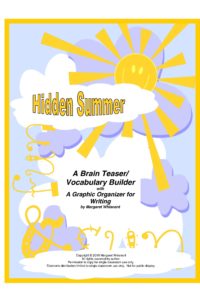
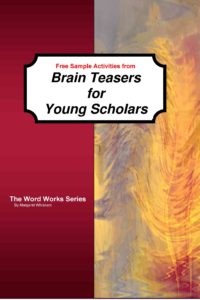
This free download is taken from Brain Teasers for Young Scholars, one of our Word Works packages.
The three activities are:
OIC: Students must answer questions with letters of the alphabet rather than words.
Connections: Tread your brightest students to a mental workout that requires studying 3 given words and determining the common word that connects them. It’s more difficult that it looks!
Categories: Students are instructed to study the sets of five words and determine their category.
Download your free activities HERE. (Use the back arrow to exit your free download)
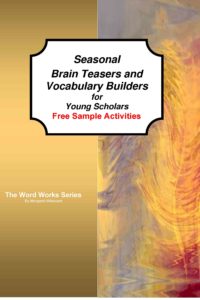
Plan ahead for November with Stuffed Words, February with Hail to the Chief, and spring/Easter with Scrambled Eggs. These three seasonal activities, taken from Seasonal Brain Teasers and Vocabulary Builders for Young Scholars of the Word Works Series, engage students in interpretive thinking, dictionary use, and research skills.
Download your free activity pack HERE. (Use back arrow key to exit your free download and return to the site.)






